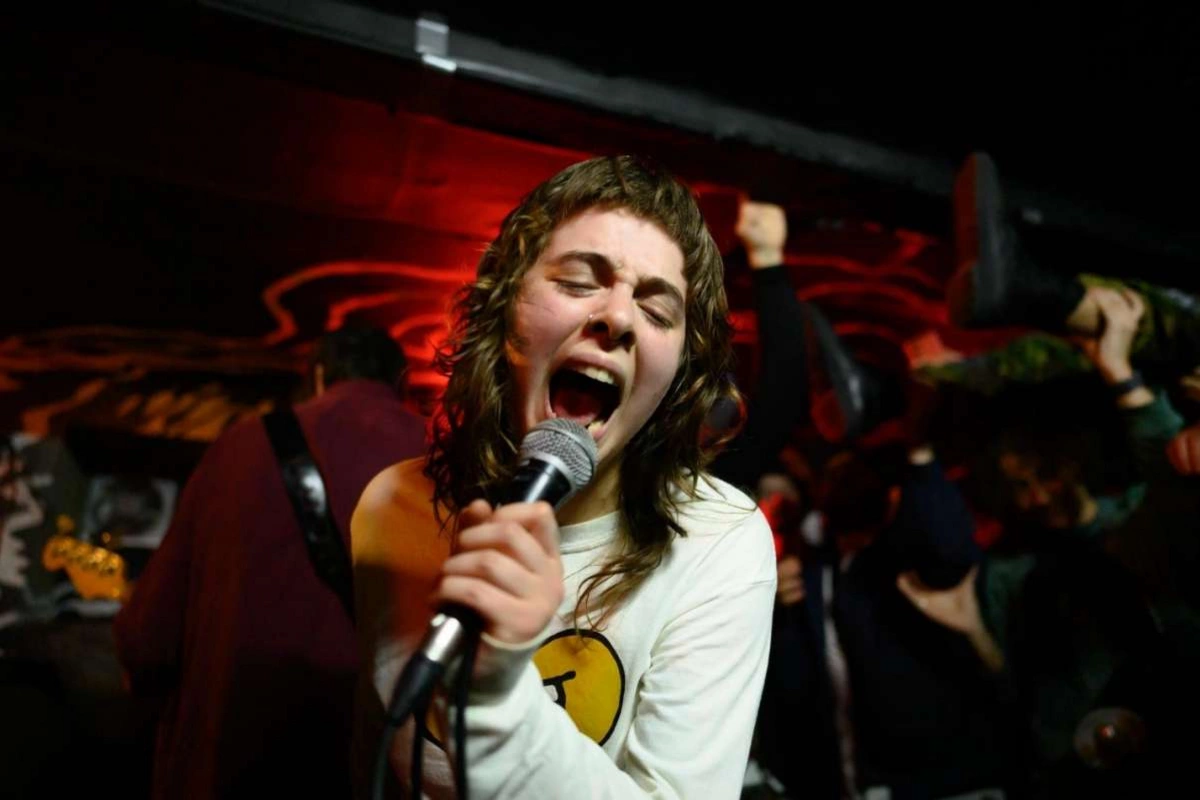
Punks in Georgia: In the wake of the war in Ukraine, Tbilisi’s already imaginative music scene is getting an added boost from an influx of alternative-minded Russians.
Jesus Sister, performing at Secret Place in Tbilisi. “I wrote these songs three years ago about what troubled me,” she says. During her performance, singer Inessa thanked the Georgian part of the audience for protesting at the recent “Russian law’ in Tbilisi.
Text and photos by Onnik James Krikorian
The lights dim. The crowd roars. Inessa Fleshler has just arrived backstage. Her diminutive frame stands in stark contrast to the heavily built male musicians around her. For four years, she’s been the lead vocalist for a noise-rock, post-hardcore punk band called



Being a female singer in the punk scene is not easy. In Russia, the feminist punk rock activist group, Pussy Riot, gained international attention in 2012 when three of its members were arrested and later convicted of "hooliganism motivated by religious hatred" after performing a protest song[1] in a Moscow cathedral. But despite the challenges, many women in Russia have persevered, using punk music as a platform to challenge gender norms and push for greater inclusivity.
In Tbilisi, there are no obvious equivalents to Pussy Riot, but the city is a place that’s no stranger to dissent and protest. Gender issues remain majorly contested here, as we saw over Pride events in 2021 and 2022, but for female self-expression, tonight’s audience (with large numbers of teenage girls and young women) suggests an improving situation.
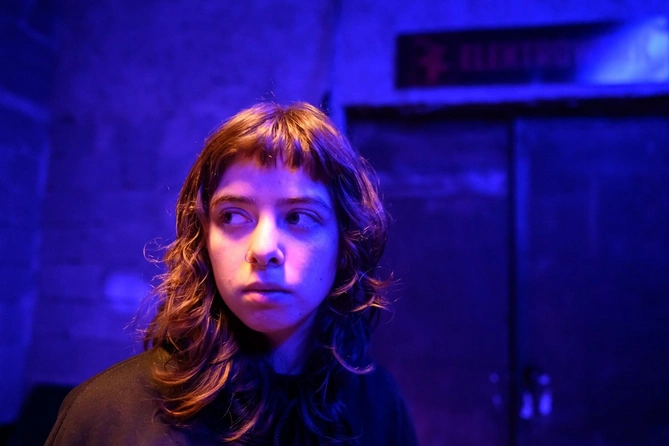
Inessa, vocalist with the Russian punk band Jesus Sister backstage at the Elektrowerk Alternative and Punk “March Fest.”
Inessa’s message for Georgian girls who want to play music is, “don’t worry. Like, I met a lot guys who told me that there was no way to be a girl and a musician. F*** all the guys. It’s not true… If you’re scared or something like that, it’s okay because it’s something new for you. You just need to overcome it, and afterwards, it’s super cool.”
“I wanted to be a musician from childhood, but I didn’t know how,” Inessa tells me, "I just realized that I could do it. And I did.”
These days Inessa lives in Israel, but she feels especially at home in Tbilisi.
“The day before the war in Ukraine, I came for a vacation with my friends to Georgia, and a day later, the war started,” she remembers. “I realized that I don’t want to go back to Russia… like, no way. That’s enough, and I moved to Israel. I just love Tbilisi and spend a lot of time here. There’s real nice people around, and I have a lot of friends here now… it’s really important to mix the cultures.”
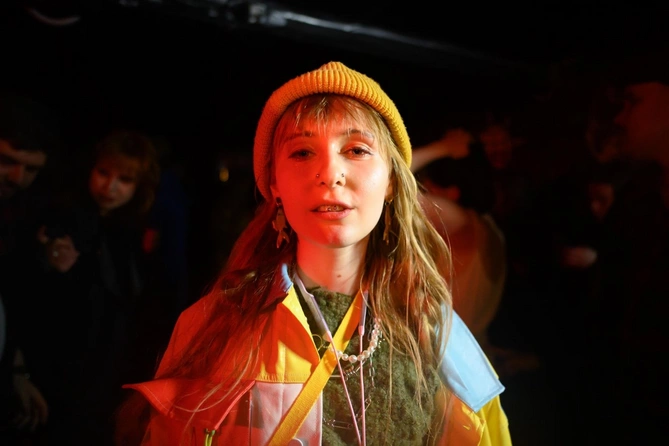
Sveta, a Russian citizen, at the Jesus Sister gig in Secret Place.
Some disagree, worried about the massive influx of Russian citizens that Georgia has experienced since the invasion of Ukraine in February last year. Exact numbers are unknown, but informed guesstimates put the figure at anywhere between 60 and 100 thousand. Many might well be draft-dodgers and economic migrants hoping to avoid the financial penalty of sanctions. But among them are genuinely creative and politically progressive types. In some ways, Tbilisi has become even more alternative since the arrival of such artistic-minded Russians, with incomers behind at least two new venues for underground art and music. One called Junkyard, co-owned by an Azerbaijani, is currently undergoing refurbishment at a new location close to Elektrowerk. Another, called Secret Place, is far more central, just around the corner from the ornate Orbeliani presidential palace.
“When we came here, it was a day before the war,” says Nick Fury, one of the members of a 15-person collective that runs Secret Place. “When everything started, all of us were confused,” but within a month, they’d decided to create “a kind of underground punk space” like equivalents in St. Petersburg. The first show was in the middle of May 2022.
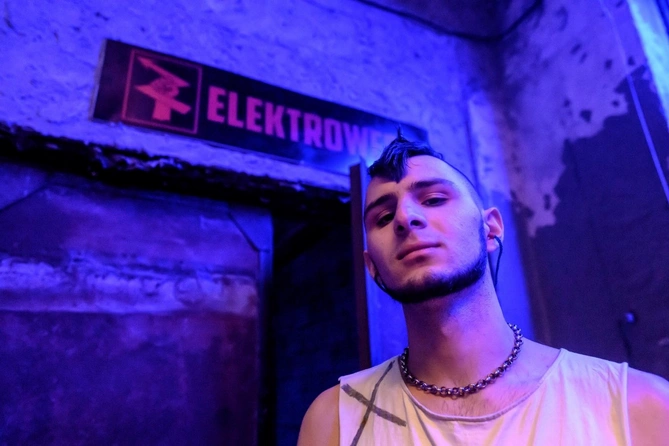
A young Georgian punk fan backstage at Elektrowerk’s March Fest.
Secret Place’s enviable location leads some Georgian punks to worry that the scene might become rapidly ‘gentrified’ with a basement space for gigs, a small vegan cafe on the first floor, and a bar on the second. Nonetheless, it is clear that the emergence of these new venues, and the presence of foreign punk bands, has rejuvenated the scene. Rock and punk had been synonymous with the socio-political scene in Georgia in the early 1990s, especially in Kutaisi. In recent years that edge had been eroded with the advent of the electronic music scene, but it now appears to be returning with a vengeance with more young Georgians seeking out live music. This could be partly a counter-reaction following bar and club closures in 2020 due to pandemic restrictions when an evening curfew was strictly enforced. But there’s no doubt that the larger Russian presence has reinvigorated and diversified the scene.
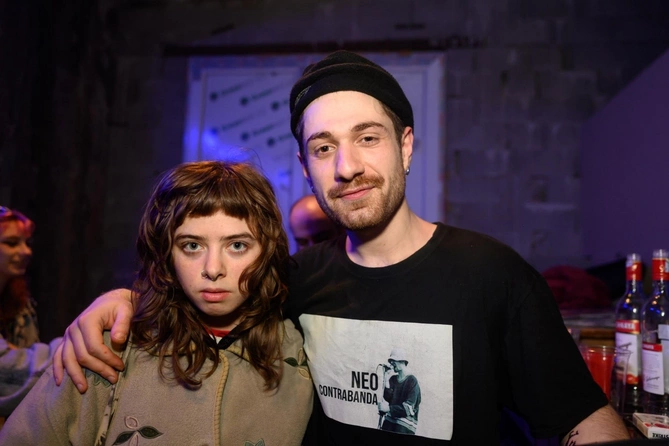
Inessa, vocalist with the Russian punk band Jesus Sister with Georgian punk-band SKAZZ’s Saba Vashakmadze at Elektrowerk.
“It’s growing,” says Saba Vashakmadze, 23-year-old member of the Georgian post-punk

Vashakmadze was one of the many street protesters opposing the passing of controversial new legislation, nicknamed the “Russian Law.”[2] SKAZZ even announced that the group would cancel its upcoming German tour if the law wasn’t withdrawn, feeling that they should remain in Tbilisi during such a critical time. Nonetheless, Vashakmadze is at pains to differentiate between individual Russian citizens and the Russian State.
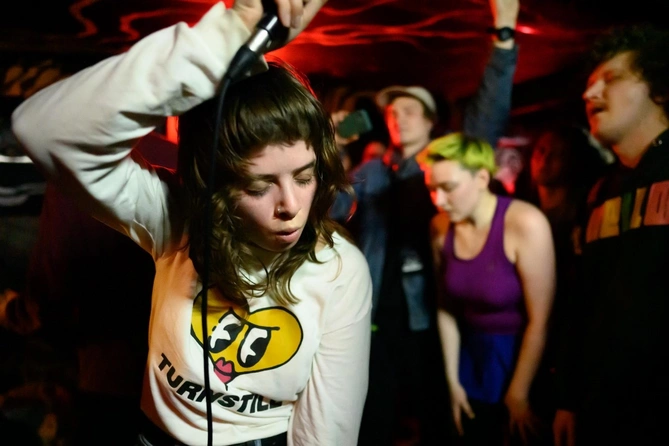
Jesus Sister, performing at Secret Place in Tbilisi.
“I think these [Russian] guys that made some clubs – some punk bars in Georgia, in Tbilisi, in Batumi – it’s important for us because before, while there was punk music here, it wasn’t so political. They’ve taught young people that they can be political. Kutaisi was political, but not Tbilisi.”
“I think every time when different musical cultures meet,” says Secret Place’s Fury, “something great is happening because we can show something to local guys, and they can show something to us. Not just Russians and Georgians but everyone who comes here. Some guys from Europe, the States, and Japan are playing here, and everyone is welcome. Punk has always been international. No borders.”
[1] The song, titled "Punk Prayer - Mother of God, Chase Putin Away!", was critical of Russian President Vladimir Putin and the Russian Orthodox Church's support for his government.
[2] Aimed at registering NGOs and media that receive more than 20 percent of their funding from abroad, and thus seen as restricting freedom of information. The protesters eventually proved successful in stopping the law’s passage.
Share on social media